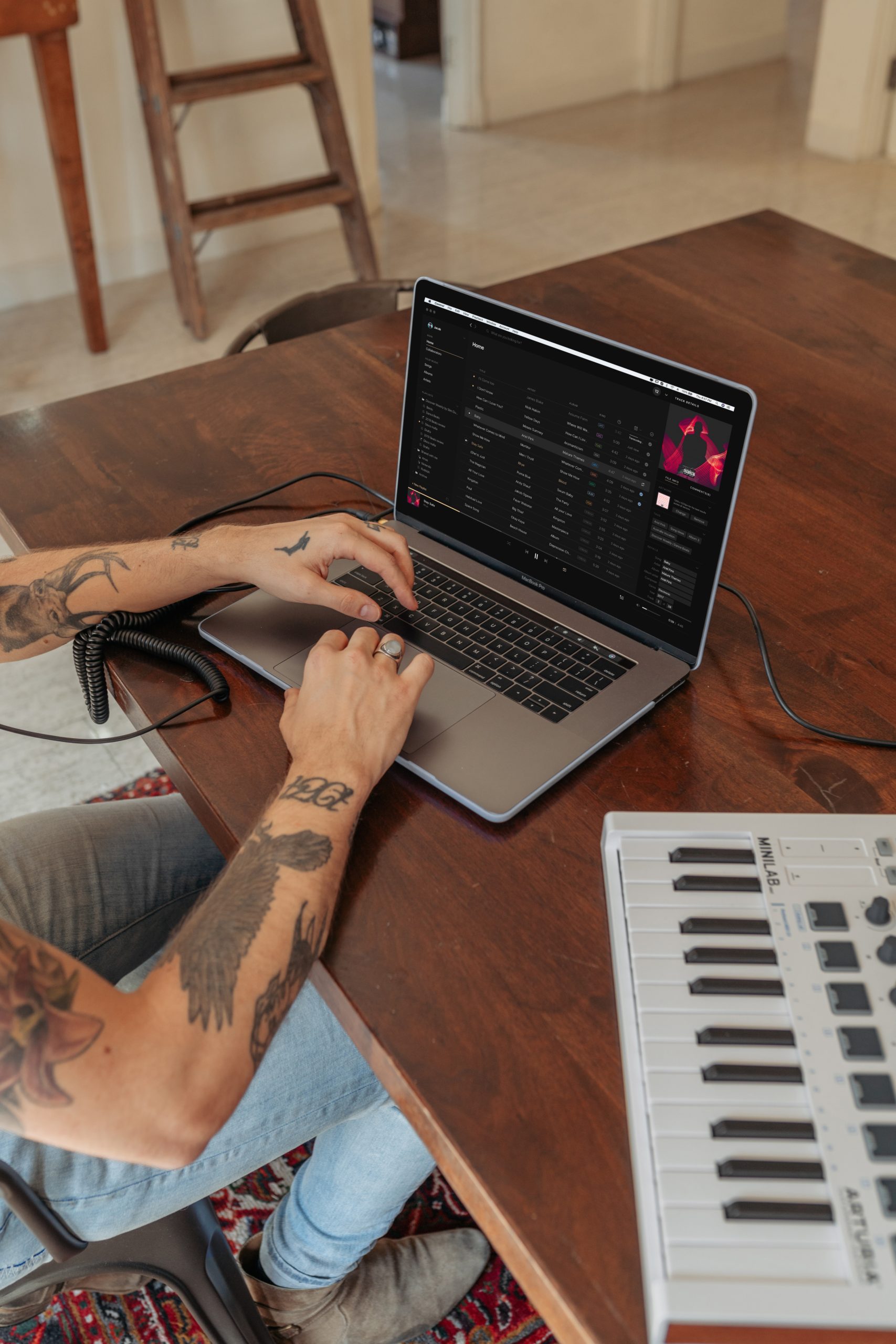How Does a Producer Get Paid?
A music producer has what many consider to be a dream job. However, there are a number of steps between making music and getting paid (if only it were that straightforward). In fact, there are myriad ways that a producer can get paid depending on their contract or the nature of their work.
How does a producer get paid? There are many answers. Producers may get paid a set amount based on contract terms with a record company. On the other hand, independent producers have a much greater degree of fluctuation between paychecks.
But there’s much more to the equation of a producer’s salary. Read on for a detailed overview of the methods (and amounts) behind a music producer’s paycheck.
How A Music Producer Gets Paid: Top Methods
Nowadays, there are so many ways to become a music producer. Some hold traditional roles working for record companies whereas others (more so than ever) are solely independent.
Because of the variety in a music producer’s work environment, there are various income sources.
Let’s go over some of the most common methods.
A Salary
The most straightforward way a music producer gets paid is through an annual salary. Just like other career professionals, many music producers work a certain number of hours each week and receive steady pay intervals.
But while receiving a salary is standard in most industries, it’s an exception rather than a norm in the music world. Many producers are freelancers, meaning that their paychecks are dependent on projects.
Like with anything else, a salaried position as a music producer has its pros and cons.
There is much less stress when it comes to meeting expenses and paying bills. With a salary, a producer can focus more on songwriting, beat-making, etcetera instead of spending a good chunk of their working time planning upcoming projects.
However, few salaried music producers stand to earn millions. Furthermore, the chance of an extraordinary windfall is far lower with a fixed-income arrangement.
Front End Fees
Front-end fees, also called advances, are payment arrangements made before project completion. For example, a producer may request a particular amount before working on a song. Later, the client may pay the rest with some leeway in determining how much.
However, there are a plethora of ways to utilize front-end fees as a music producer. One might choose to charge the full, fixed amount up-front. Another may charge a minuscule up-front fee but request “points” in which they receive a share of future royalty payments.
In any case, front-end fees are one of many tools that give both producers and their clients more flexibility. Ultimately, it’s up to the producer and the recording artist or label to decide the details.
Streaming Royalties
As posh and fancy as it sounds, not all musicians who earn royalties live like royalty. Music producers are rarely able to live off royalties alone.
“What are royalties?” you might ask.
Royalties are a type of passive income owed to song owners whenever their work is played, copied, or distributed. Streaming royalties are a newer concept, in which platforms like Spotify and Apple Music pay fractions of cents to the appropriate legal songwriter each time you listen to a song.
Due to the small payout, it takes an enormously successful piece of music for a producer to be able to rely upon its revenue.
Mechanical Royalties
In the increasingly less frequent event someone buys a song, producers may receive a payment of 9.1 cents per reproduction. With the exception of independent musicians, producers rarely get the full 9.1 cents.
Instead, record contracts usually split the amount between several individuals involved in creating, planning, and arranging the composition.
Leasing
It seems like you can lease anything nowadays, and music is no exception. For example, many producers may lease beats, melodies, basslines, and more to others while maintaining ownership. Thus, others may use their work — but the producer retains intellectual copyright.
Leasing is an alternative to selling that allows producers to continue receiving income from one piece of music. So, while the payout for leasing vs. selling a track is much less, there is greater potential for future profits.
Selling Rights
The last payment method we’ll discuss is selling rights.
When a producer sells the right to a song, they relinquish all ownership. Any future royalties will be paid to the future song owner. Occasionally, though, the person or entity purchasing those rights will be kind enough to split a small sum of future earnings with the producer. Again, this is all contract-dependent.
Selling the rights to a song lends itself to the largest payouts music producers receive. Because the buyer knows that only they, not the producer, will see future benefits, they tend to be understanding (and appropriately generous).
Furthermore, most clients purchasing (rather than leasing) song rights are corporate entities. Their budget and earning potential are much greater than the average individual’s. Thus, it is fairly common for producers to make thousands, if not millions, for selling track rights.
How much does a producer make for a hit single?
It’s easy to think of the most successful songs and ponder how much the minds behind them received. Of course, any producer behind a hit single that touches millions of listeners is undoubtedly in the top 1% of earners.
“A lot of money” is an accurate but incomplete answer. The thing is that even producers behind Billboard Hot 100 hits could earn anywhere between “a few extra bucks” to “early retirement and a yacht to celebrate” kind of cash.
In other words, it’s a gigantic range. A platinum single, for example, might net the music producer up to $2.5 million. However, some producers wind up making nothing. Again, it all has to do with the contract.
Perhaps a better way to answer this question would be to consider a famous example.
The song, Yesterday, by The Beatles, earned over $30 million throughout its 50-ish-year lifetime. In other words, it earned more than most people make in their lifetimes. The esteemed producer George Martin (aka the “fifth Beatle”) earned a good chunk of his $65 million fortune through this song.
Of course, he isn’t the only one.
How much should a producer charge?
Most music producers aren’t earning tens of millions of dollars per year through making hit singles. However, the fact that such earnings are possible proves how much a producer’s salary can vary.
Self-valuation is a struggle for any professional who wants to get paid fairly while maintaining humility. Producers are no different. Some overestimate their talents, and plenty do the opposite — failing to advance their career as much as they deserve.
Knowing what a reasonable rate looks like is helpful in negotiations for both the client and the producer.
A new music producer should charge between $300 and $500 per project. This enables one to cover production costs and receive a decent profit for your efforts. For someone in the market for music production services, it’s enough to incentivize decent work while keeping a tighter budget.
As for intermediate and experienced producers, the going rate is understandably higher. Furthermore, it depends on how much a music producer contributes to the entirety of an album or track.
An experienced beat producer can certainly bring in some dough by selling a “non-exclusive” beat for $30, for example. Plus, there’s no limit to how many people can purchase the rights to use it. Nevertheless, a producer who does more of everything — from the beat to the melody and lyrics — can more easily negotiate a higher project payout.
But what about a typical producer who is neither brand-new nor a massive star? How much would he or she charge?
Most producers charge between $30 and $50 per hour of work in the studio. Again, there is ample fluctuation in the amount of even an ordinary producer. But don’t be afraid to charge (or pay) at least this amount if you’ve built up a decent music portfolio.
Oh, and one final thing to note here…
While there is a quantifiable floor for what a music producer should charge, there is no ceiling. At the absolute highest end, the world’s top-earning music producers bring in truly colossal sums. Very, very few can afford to meet the bill of a legend such as Rick Ruben or Dr. Dre.
Why hire a producer?
Why hire a music producer? Even $30 an hour is a lot to ask for someone on a small budget.
Indeed, there are pros to sparing yourself the money and composing music on your own. But there are also significant benefits to be had from hiring a reputable professional — if you can afford it.
Here are some of the most compelling reasons to hire a music producer:
A Music Producer Provides Another Perspective
Music is subjective. You might be in love with a set of lyrics, melody, or musical vision but that doesn’t mean your target audience will feel the same way.
A producer can provide a much-needed reality check. This isn’t to say that a producer’s job is to degrade and insult your artistic integrity. Instead, a producer can suggest how to tweak a track or album to suit a wider variety of tastes.
Thus, after some constructive criticism and brainstorming, you’ll end up with a piece that you, your producer, and thousands (or millions) of fans will love as much as you do.
A Producer Can Help Perfect Sound Quality
It’s deceptively difficult to turn a song into a crisp, high-fidelity track. But it’s not hard to imagine how strongly recording quality affects listener enjoyment. Even a janky, noise-ridden bedroom recording can be transformed into something phenomenal with some studio magic.
Many producers specialize in just this kind of thing. If you hire one, he or she can assist you in giving your song as much oomph as possible to move listeners. Also, you can focus on songwriting with a producer handling the technical aspects of recording and editing.
A Producer Can Connect You to Other Musicians
Someone who’s been in the industry for many years knows countless people. Indeed, an experienced producer is a great networking asset to those seeking to expand by forming a band or doing a collab.
Furthermore, a significant part of a music producer’s song is choosing the right artists for a project. So not only can a music producer connect you to other musicians, but he or she can also recommend specific candidates after learning more about your tastes and your personality.
Even solo artists can benefit from meeting other musicians. Collaborative songwriting isn’t the only way to inspire and be inspired by other talented people.
A Producer Offers Skills You May Lack
All musicians have weaknesses, believe it or not. Not all great vocalists are exceptional bassists. Not all brilliant lyricists write impeccable melodies.
A producer is just one example of how uniting different skillsets only benefits the music.
Even if you don’t want to admit you’re not the best at something, a producer can even act as a teacher. Interacting with those more experienced may be humbling, but it is an enormous asset to growing your talents.
This is the same reason you hear, “choose your friends wisely”. Crappy friends can turn you into a crappy person. Excellent friends have an equal and opposite effect.
You don’t even need to hire a producer to reap the benefits. Spending time with incredible artists will help you become the best musician you can be.
Do producers make beats?
Music producers produce music. Duh. But can producers also specialize in making beats?
Absolutely. Many producers only make beats. A common approach is to create a variety of beats and post them to a stock marketplace such as PremiumBeat. Then, clients such as business organizations and other producers may purchase rights to use them.
Guess what? Few producers are the best at every element of music. Specialists, such as producers who make beats, enhance the quality of music projects.
Beatmakers, lyricists, composers, and songwriters are a testament to the power of individuality. Together, they can bring out the best in everything and reveal the true power of collaboration.
Yeah, that may sound a bit cheesy – but in cheese lies truth (source: my weird brain).
Do you need a producer?
Once again, having a producer sounds nice and all, but there are two substantial drawbacks that’ll deter many folks:
- Producers can be costly
- Hiring a producer means losing some artistic control.
Do you need a producer? No. Could you use one? Absolutely.
Again, we understand that not everyone is in a position to hire a professional. Nevertheless, some people feel like they can’t be successful without one. Fortunately, this is false.
You don’t need a producer to be successful. Independent musicians have it easier than ever when it comes to producing stunning tracks at home. DAW software and a decent microphone can turn any room into a studio for less than $1,000.
But music producers remain valuable industry assets (and we love them). Furthermore, nothing is stopping you from hiring a producer in the future to turbocharge your career growth. There are plenty of professionals from which to choose.
Producer vs. Songwriter
It seems like producers and songwriters have similar roles, in that a producer produces music whereas a songwriter writes music.
But don’t “produce” and “write” entail the same thing? Well, kind of.
It’s not wrong to use the terms producer and songwriter interchangeably. Many are both. In fact, it’s doubtful that a (sober) producer will spit in your face if you use the word “songwriter.”
Nevertheless, there are a few very subtle differences between the two professions. In some regards, it resembles the relationship between architects and structural engineers.
The architect (who is more like the songwriter) drafts and designs a building. Meanwhile, the structural engineer (the producer) fleshes out the logistics so that the building is practical, durable, and materialistically cost-effective.
Likewise, songwriters tend to focus more on the song itself — the feelings it conveys, the story it shares, etcetera. Producers bring in a dash of business sense to ensure that the music is profitable and appeals to its intended audience.
Ultimately, the distinction is minimal and subjective.
Conclusion
Music production is a complex industry with a wide range of standards. How one producer makes a living will differ from the next. Selling music rights, receiving royalties, and sometimes getting a traditional salary are just a few examples of how producers get paid.
Furthermore, income flexibility is greater than ever for music producers. Technology advancements have significantly lowered the cost of at-home music production, boosting the percentage of independent and freelance producers.
But just as there is great flexibility in how producers get paid, there are huge differences in what producers get paid. Most charge $30 to $50 per hour working in the studio (or at their desk). Meanwhile, the top-earning music producers have amassed multi-million-dollar fortunes throughout their careers.
Now, you’ll know a bit about what to expect whether you’re looking to hire or become a music producer.







